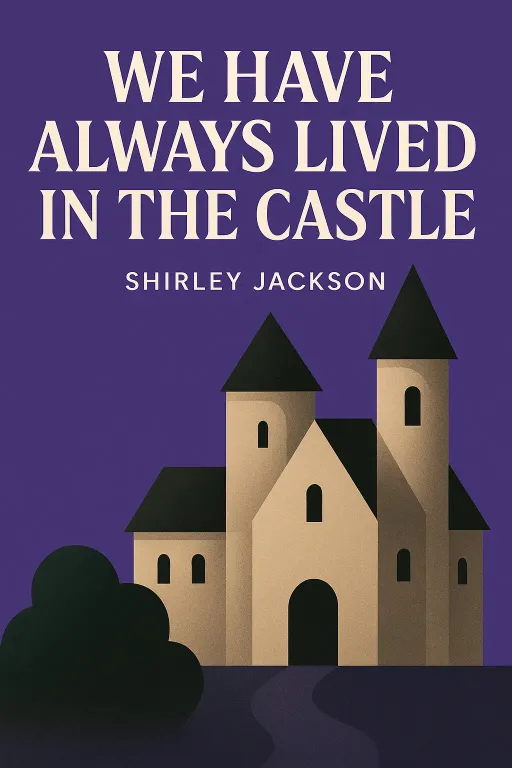
We Have Always Lived in the Castle
10 minIntroduction
Narrator: Imagine an eighteen-year-old girl walking through a hostile town. With every step, she endures the hateful stares and cruel whispers of the villagers. To survive these bi-weekly trips for groceries, she retreats into a fantasy world, a place where she lives happily on the moon, far from their judgment. She imagines the people who torment her suffering terrible fates, their bodies rotting away. This isn't just a dark daydream; it's a necessary shield. For Mary Katherine Blackwood, known as Merricat, this blend of ritual and resentment is the only way to protect the fragile sanctuary she shares with her sister, Constance, and their ailing Uncle Julian. They are the last surviving members of a family shattered by a tragedy six years prior—a tragedy the village has never forgotten, or forgiven.
This chilling exploration of isolation, paranoia, and the fierce, desperate love between sisters is the heart of Shirley Jackson's final novel, We Have Always Lived in the Castle. It delves into the minds of those who have been cast out by society and asks what happens when they decide to lock the door and build a world entirely of their own.
The Sanctuary of Ritual and Isolation
Key Insight 1
Narrator: The Blackwood family's existence is defined by a strict, self-imposed isolation. Following a notorious poisoning incident that killed most of their family, the surviving members—sisters Merricat and Constance, and their wheelchair-bound Uncle Julian—live as recluses in their ancestral home. The house itself is more than a building; it's a fortress, weighted down with generations of family history and property, a steady bulwark against a hostile world. Their life is governed by routine and ritual. Constance, who was acquitted of the poisoning but has not left the property since, manages the household with meticulous care, tending her garden and preserving food. Uncle Julian obsessively writes and rewrites his account of the fatal day, trapped in a loop of memory.
Merricat’s role is that of the protector and forager. Twice a week, she must brave the animosity of the nearby village to buy groceries. These trips are ordeals of psychological warfare. The villagers, who resent the Blackwoods for their wealth and perceived arrogance, openly taunt her. Children chant a cruel nursery rhyme about her sister being a poisoner. To endure this, Merricat employs powerful coping mechanisms, primarily a retreat into fantasy. She imagines herself on the moon, a place of peace and safety. She also practices a form of sympathetic magic, burying significant objects and nailing others to trees to create a protective ward around their property. These rituals, along with her fierce, violent thoughts toward the villagers, are her weapons against a world that wishes them harm.
The Unwelcome Intrusion of the Outside World
Key Insight 2
Narrator: The Blackwoods' carefully constructed sanctuary is fragile, and the outside world constantly threatens to breach its walls. These intrusions begin subtly, with the regular Friday visits of Helen Clarke. Unlike the other villagers, Helen’s hostility is veiled in concern. She believes she is doing the right thing by encouraging Constance to re-enter society, suggesting she has done "penance long enough" and should start attending luncheons. To Merricat, this is a terrifying proposition. The idea of Constance leaving their safe world for the one that judged and condemned her is unthinkable.
During one visit, Helen brings a guest, Mrs. Wright, whose morbid curiosity about the family tragedy is barely concealed. The visit becomes a tense affair, culminating in Uncle Julian’s rambling, detailed account of the poisoning, which horrifies Helen but fascinates Mrs. Wright. For Merricat, this visit confirms her deepest fears: outsiders only want to gawk at their pain and disrupt their peace. The visit plants a seed of change, a sense of impending doom that Merricat feels in her bones. She notices Constance looking out at the world with a new, contemplative expression, and hears her wistfully say, "Sometimes I feel I would give anything to have them all back again." This hint of longing in Constance represents the greatest threat to Merricat’s world, a threat from within that she is powerless to control with her usual magic.
The Catalyst of Chaos: Cousin Charles's Arrival
Key Insight 3
Narrator: The vague threat of change materializes with the unexpected arrival of Cousin Charles Blackwood. He appears one day without warning, a ghost from a part of the family that had disowned them after the trial. His presence immediately shatters the household's delicate equilibrium. While Constance, in her gentle and trusting nature, welcomes him as family, Merricat instantly recognizes him as a dangerous intruder. She sees him not as a cousin, but as a demon who has breached her magical defenses.
Charles makes himself at home with an unsettling ease. He moves into the deceased father's bedroom, wears his clothes, and shows an obsessive interest in the family's finances, particularly the contents of the locked safe. He systematically undermines Merricat’s role in the house, taking over her trips to the village and attempting to drive a wedge between the sisters. He represents the greedy, judgmental, and masculine world they had escaped. Merricat’s resistance becomes overt and destructive. She smashes a milk pitcher, breaks a mirror in his room, and openly describes the effects of deadly mushrooms at the dinner table. Charles, in turn, tries to assert his dominance, belittling Merricat and trying to convince Constance that their life is abnormal and that he can bring them back to reality. His intrusion forces a confrontation between Constance’s tentative desire for normalcy and Merricat’s absolute need for their isolated sanctuary.
The Purifying Fire and the Wrath of the Village
Key Insight 4
Narrator: As Charles's control over the house and Constance grows, Merricat becomes increasingly desperate. After a heated argument where Charles orders her to her room, she commits her most extreme act of magical cleansing. Believing his pipe to be the source of his corrupting influence, she pushes it into a wastebasket full of newspapers and sets it on fire, intending only to smoke him out of the house. The act quickly spirals out of control, and the top floor of the Blackwood home is engulfed in flames.
The fire acts as a beacon, drawing the very villagers Merricat has spent her life avoiding. The fire department arrives, but so does a mob. The villagers’ long-simmering hatred, envy, and suspicion finally boil over. As the fire is being fought, they unleash their fury on the house, smashing windows, destroying priceless family heirlooms, and ransacking the rooms. They chant their cruel rhyme, turning Constance’s gentle offer of tea into a vicious taunt: "Merricat, said Constance, would you like a cup of tea?" In the midst of this chaos, Uncle Julian dies of a heart attack. The fire that Merricat started to expel one intruder has invited in the entire world, and it has come to destroy them. The sisters flee the wreckage and hide in the woods, their sanctuary shattered.
The Castle Reborn: A Final, Unbreakable Isolation
Key Insight 5
Narrator: When Merricat and Constance emerge from their hiding place, they find their home a ruin, but their world strangely purified. Charles is gone, Uncle Julian is dead, and the house has been purged by fire and violence. They barricade themselves inside the few remaining habitable rooms—the kitchen and the cellar—and create a new, even more isolated existence. The destruction has created the ultimate fortress. The villagers, now ashamed of their rampage and spooked by the sisters’ survival, begin to see them as something otherworldly. Their hostility transforms into a kind of fearful penance.
Anonymously, they begin leaving offerings of food on the porch: roasted chickens, casseroles, and pies. The sisters accept these gifts, a silent, transactional peace treaty. They are now entirely dependent on the village, yet more separate from it than ever before. They have become local legends, the subjects of ghost stories told by children who dare each other to approach the ruined house. Inside their broken castle, Constance and Merricat achieve a strange and complete happiness. They have everything they need and are finally, irrevocably, safe from the outside world. Merricat looks at her sister and says, "Oh, Constance, we are so happy." In the end, they have always lived in the castle, and now, the castle lives only for them.
Conclusion
Narrator: Shirley Jackson's We Have Always Lived in the Castle is a masterful study in how outcasts create their own rules for survival. The book’s most powerful takeaway is its exploration of sanctuary not as a place of perfect peace, but as a reality actively constructed and fiercely defended against a hostile world. For the Blackwood sisters, happiness isn't found by rejoining society, but by retreating from it so completely that its rules no longer apply. They build their fortress not just with locks and barricades, but with ritual, fantasy, and an unbreakable bond that transcends conventional morality.
The novel leaves us with a haunting question about the line between protection and madness. The sisters’ final life is a victory of their own making, a peaceful existence born from violence and tragedy. It forces us to consider the lengths to which we might go to feel safe, and to ask ourselves: when the world casts you out, is building your own, however strange, the only sane response?


